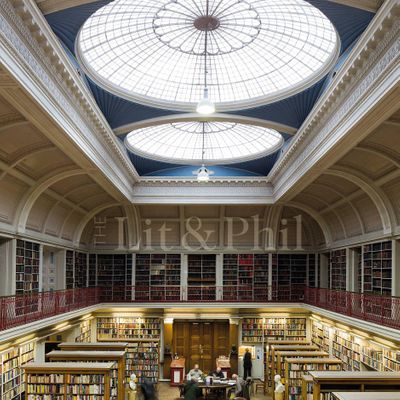NU Ideas Season 3 | No.1
Schedule
Tue Oct 29 2024 at 06:00 pm to 07:00 pm
Location
The Lit & Phil | Newcastle Upon Tyne, EN

About this Event
Tuesday 29th October | 6pm
What Makes Space Sing? (And Why Should I Care?)
Daniel Ratliff, Vice-Chancellor's Fellow/Assistant Professor
Department of Mathematics, Physics and Electrical Engineering at the Northumbria University.
Applied Mathematics in Fluid Dynamics and Space Plasmas
The Earth, and other planets, are surrounded by seas of charged particles that zip around to create electromagnetic waves. Thanks to the quirks of particle physics these waves can end up being quite bizarre, so much so that they sing - to the point where they sound like birdsong in the morning (the dawn chorus). How the heck does space pull this off? We look under the hood to find the answer, and there’s something troubling there… maths!?
This talk recounts my journey as a mathematician to uncover something fundamentally cool about space and how to even tell you about it without everyone falling asleep, with a little help from our oceans along the way (which, as it turns out, are themselves a little tone-deaf). In doing so, however, we stumble upon something quite alarming - is this marvellous melody more of a siren song after all?
This talk was something I trialled at the Pint of Science Festival last year (and it was good fun!), and I've developed it thanks to additional runs I did for the NU:STEM evening lecture series 23/24. I've also dabbled at the LIFE centre, running Colours of the Sun with Steph Yardley over Spring Half Term this year and will be running a 3-day exhibition this summer on the talk above - giving kids a hands-on way to sound like space with slide whistles.
The James Webb Space Telescope: New Eyes on the Universe
Henrik Melin
The James Webb Space Telescope (JWST) has provided a radically new lens through which we can view the Universe. It is the largest, most complex, and most sensitive observatory ever launched into space and has already gifted us awe-inspiring pictures and data: from planets and bodies inside our own Solar System, to planets around other stars, to the first galaxies ever formed. Its gold-plated segmented mirror, and the four state-of-the art instruments are completely revolutionary, providing new tools with which to decipher the cosmos. In this presentation I will talk about some of the technologies that enables this new science, and l showcase some of the most incredible discoveries made by the telescope, including how I use JWST to unlock the secrets of the giant planet (Jupiter, Saturn, Uranus, and Neptune) at Northumbria University.
A LIVE Lit & Phil Event | FREE
(If you would prefer to book directly over the phone, please call the Library Desk team on 0191 232 0192 and they will be happy to help.)
Where is it happening?
The Lit & Phil, 23 Westgate Road, Newcastle Upon Tyne, United KingdomEvent Location & Nearby Stays:
GBP 0.00
